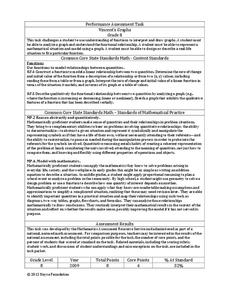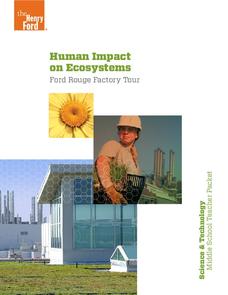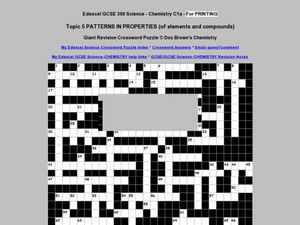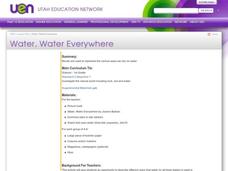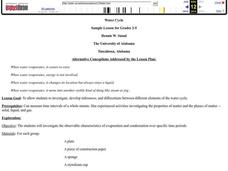Curated OER
Chapter 14 Review, Section 3: Acids and Bases
Aside from a mention of a textbook page, this chemistry assignment is a suitable review of acids and bases. It begins by addressing conjugate pairs and acid base reactions. Neutralization and amphoteric properties are also dealt with....
Inside Mathematics
Vencent's Graphs
I like algebra, but graphing is where I draw the line! Worksheet includes three multiple-part questions on interpreting and drawing line graphs. It focuses on the abstract where neither axis has numbers written in, though both are...
Curated OER
The Water Cycle and Global Warming
Students study the flow of water in the environment. In this water cycle lesson students evaluate the consequences of changes in the water cycle using data.
Curated OER
Discovering the Properties of Matter
Students identify the properties of the three states of matter and observe the movement of Oobleck and be able to compare its movement to that of solids and liquids. They record in their Science Journal what they discovered about Oobleck.
American Chemical Society
From Gas to Liquid to Solid
From gas to liquid condensation to solid frost, water undergoes phase changes before students' eyes! Using ice, salt, water, and a metal can, they set up an investigation that can be used in a physical science setting, or as part of a...
American Chemical Society
Change in Temperature - Exothermic Reaction
Alone, or as part of the intended unit on chemical reactions, this activity allows learners to experience an exothermic reaction. Here, learners add calcium chloride to a baking soda solution and watch the temperature rise! They will...
Curated OER
WS 8.8 Molality and Colligative Properties
In this molality and colligative properties worksheet, students determine the molality of solutions and they calculate freezing point depressions and boiling point elevations of solutions.
Cornell University
Polymers: Making Silly Putty
Putty is proof that learning can be fun! Share the wonderful world of polymers with your class through an experiment. Young scientists create their own silly putty, then examine its properties.
Curated OER
The Properties of Air
First graders draw conclusions about the properties of air. In this properties of air lesson, the teacher demonstrates several properties of air and guides students through discovering that air is colorless, tasteless, odorless, exerts...
Curated OER
The Open Ocean, What is it and How Does it Change?
Students investigate the ocean environment. In this ocean lesson, students discover the physical properties of the ocean. Over two days, students work in small groups investigating ocean maps and creating water currents.
Curated OER
Sweat Your Socks Off
Fourth graders explore evaporation by conducting an experiment. In this water properties lesson, 4th graders examine the differences between two socks that get wet, one which is placed in front of a fan. Students discuss why...
Curated OER
Water Vapor Equilibrium
In this chemistry worksheet, students complete 12 short answer questions and problems on water vapor equilibrium. They calculate equilibrium concentrations of reactants and products.
Curated OER
What is in the Water?
In this mixtures worksheet, high schoolers read about mixture and what determines if a solute dissolves in a solvent. They answer three questions about solutions and determine from a list of compounds which are soluble in water.
Curated OER
Earth: The Water Planet
Students elicit data on the water cycle, ocean topography, and island formation in this six lesson unit. The ocean floor and the properties of water are examined through a variety of discussions and hands-on experiments.
Henry Ford Museum
Human Impact on Ecosystems
An environmenta science unit includes three lessons plus a cumulative project covering the ecosystem. Scholars follow the history of the Ford Rouge Factory from its construction on wetlands and how it destroyed the...
Curated OER
Density as a Unique Physical Property
Students find the density of objects by finding their mass and their volume. In this density lesson plan, students determine the mass of objects, the find the volume by using formulas or by water displacement and they calculate the...
Curated OER
Rain and Rainbows
Students explore the weather system by analyzing water properties. In this precipitation lesson, students review weather related vocabulary terms and discuss how rainbows are created by light hitting droplets at the right time. Students...
Curated OER
Fun with Surface Tension!
Young scholars explore physical science by participating in a water properties experiment. In this surface tension lesson, students utilize pennies, water, a dropper and soapy water to test the different surface tensions with numerous...
Curated OER
Patterns in Properties (of elements and compounds)
In this element properties worksheet, students complete a crossword puzzle with 91 questions related to properties of elements and compounds.
Curated OER
Properties of Soil: Original Lesson Plan
This lesson is an investigation of soil properties, particularly texture, color and space for air and water. Student inspect soil samples found in their locale, perform several tests to determine different properties, and involves a ...
Curated OER
Water, Water Everywhere
First graders study water-its properties, its 3 states, and the way we rely on it for everyday living. They read Water, Water Everywhere, draw murals of where they have seen water and the ways they use it and eat/drink snacks that are...
Curated OER
Water and Ice
Students explore water as it changes states of matter. In this physical property lesson, students use observation, measurement, and communication skills to describe changes in water as it goes from a solid to a liquid and back again.
Curated OER
States of Matter
Students explore the states of water. In this physical science lesson, students use ice and dry ice to observe the changes in the state of matter. Students record the results.
Curated OER
Water Cycle
Students investigate, develop inferences, and differentiate between different elements of the water cycle. They investigate the observable characteristics of evaporation and condensation over specific time periods



